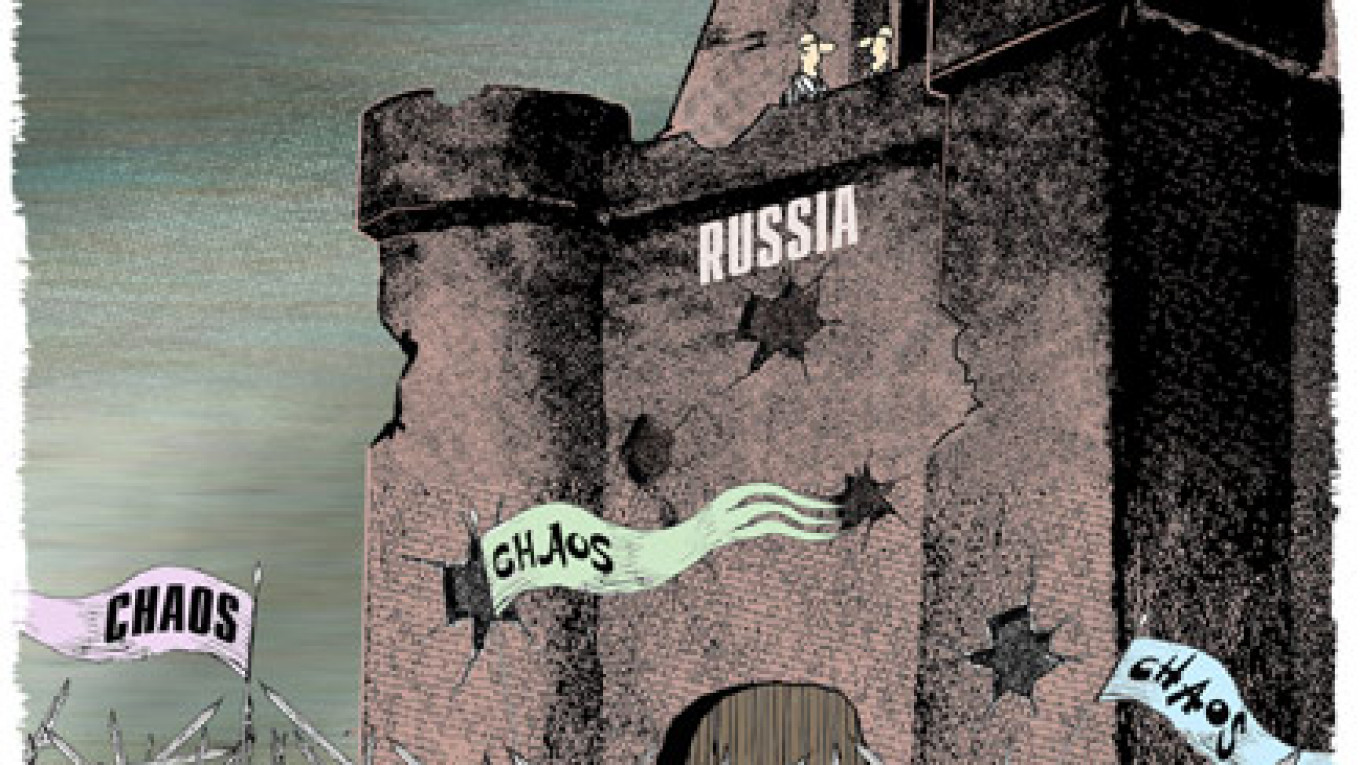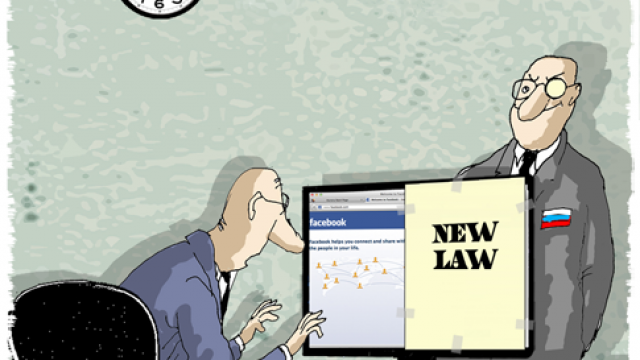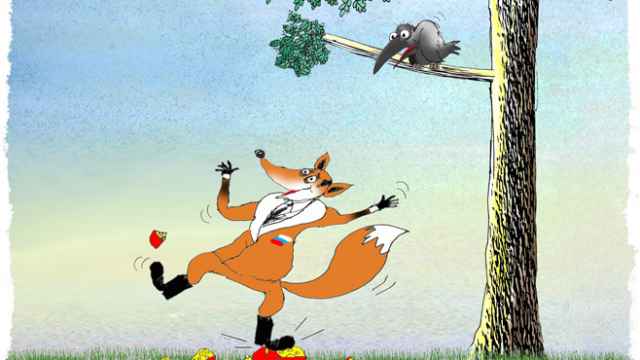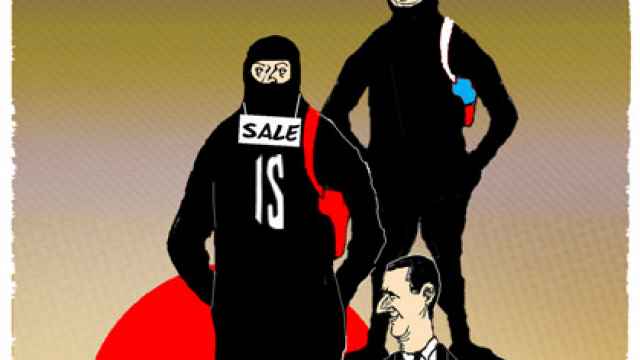Judging by the content of state-controlled television, Russia is primarily focused on its foreign agenda. In fact, Russia does not appear to even have a domestic agenda — that is, other than occasional reports that Duma deputies have found something else to prohibit.
But of course Moscow does has a foreign agenda. After all, leaders use their portrayal of the outside world to show that Russia's "besieged fortress" is surrounded by enemies and that the rest of the world is deeply troubled. Every day brings another disaster: severe weather conditions, wars, and now refugees who will soon turn Europe into a filthy and barbarian "caliphate."
Of course, the refugee story came along at a good time for Moscow leaders. The Russian people were already getting fed up with Ukraine and only the occasional political talk show guest would dutifully refer to the "junta in Kiev."
Meanwhile, television images showing throngs of "barbarians" threatening European values began appearing just as Russia held elections in approximately two dozen regions.
In some countries that might have sparked greater debate on the domestic agenda, but not in Russia: here, only a smattering of online media outlets discussed the fact that most regional budgets are on the verge of bankruptcy.
Not only the "party of power," but also the non-systemic opposition parties seemed to have gotten through these elections without developing coherent platforms or even making much effort to campaign creatively.
The over-simplification of the political debate and, as a result, the campaigning process, has led to a further decline in voter turnout — in some regions totaling only a little more than 20 percent of the eligible population.
This calls to mind the traditional interpretation that Russia has simply replaced its domestic agenda with its foreign agenda. In order to distract the people from the hardships of the economic crisis, leaders involve the country in one foreign "adventure" after another. And they have been remarkably successful: not a word of popular dissent is audible, despite the sharp decline in the economy and standard of living.
Meanwhile, the authorities maintain a bold foreign agenda. Russian leaders are trying their hand at shaping world events — and how that effort will end remains uncertain at best.
Start with the fact that Russia did not get involved in Ukraine for no reason.
It was inevitable because the regime that came to power in Kiev was bent on building a new state identity based largely on confrontation with Russia, and also because of Moscow's misguided policies and the West's desire to play "tug of war" over Ukraine.
However, as it turns out in light of new circumstances, Ukraine is not the only test of the European Union's viability. Having barely passed the "Greece test," the EU now faces an "invasion of barbarians," and it remains unclear how European institutions and the public as a whole will cope with this challenge.
The refugee problem is not a fictional agenda item. One out of every 10-12 residents of the developing world is a potential refugee — meaning tens of millions of people.
That problem is just one manifestation of the global economic crisis that is only exacerbated by the widely divergent levels of development between the planet's northern and southern hemispheres.
The world is also undergoing a crisis in global politics. Observers can laugh as much as they want at the idea of "universal human values" and former Soviet leader Mikhail Gorbachev's naive concept of "new political thinking," but there is no arguing with the fact that the world "took the wrong path" when it left the Cold War behind.
Now we are headed together in the wrong direction, when it would have been possible to avoid the Ukrainian crisis if we had only taken a different path.
As a recent joke points out, a few years ago Israel was the only Middle Eastern country at war. Today it is one of the calmest. The group of permanently warring countries in the region now stretches from Pakistan and Afghanistan in the east to Libya in the west — and threatens to expand even further westward.
The next stop might become Russia's "soft underbelly" — Central Asia — as the current generation of post-Soviet, secular, authoritarian rulers loses power. The first signs of that trend seem to be appearing now in Tajikistan.
Although it has been said before, militant Islamism was born during the Soviet invasion of Afghanistan and it threw down a challenge to all of Christian civilization on Sept. 11, 2001. Had that civilization — that includes both Russia and the United States — banded together then, it could have eliminated that threat forever. However, such cooperation never took place.
Having "gotten the country up off its knees" in the early 2000s, the Russian ruling bureaucracy could not resist the temptation of indulging in a hefty dose of anti-Western and anti-U.S. rhetoric.
For its part, the West excelled at applying double and even triple standards in its relations with other countries.
And that is the logic of the modern world. Gross domestic product is everything: The strong and wealthy states take little interest in the weak and poorer countries. However, that attitude might eventually lead to a "rebellion of the marginalized."
That is already happening in the greater Middle East region. Libya lies in ruins and Saudi Arabia is fighting in Yemen, which is itself relying on the protection of the Egyptian army.
Of Jordan's 4 million citizens, 1 million are now refugees. Hezbollah now runs the once-prosperous country of Lebanon. Iraq has broken up into three parts that largely follow the boundaries of the former provinces of the Ottoman Empire from which the country was originally cobbled together almost a century ago.
The superpower states were twice proven incapable of subduing Afghanistan.
After U.S. forces withdraw from that country next year, either the Taliban — the lesser of two evils — will take control, or else the Islamic State will reign.
And as for the latter scenario, forces from a coalition of 60 states have been bombing the Islamic State for months, and yet the organization continues to seize ever more territory.
It appears that Russia's foreign agenda will continue to eclipse its domestic agenda. And while Moscow might manage to relieve some domestic tension by "orchestrating" its foreign agenda — freezing the conflict in Ukraine and "exchanging" it for the conflict in Syria — recent experience shows that world events have a way of spiraling out of everyone's control.
When this or that country sets out to achieve "controlled chaos," the inevitable result is general chaos.
Georgy Bovt is a political analyst.
A Message from The Moscow Times:
Dear readers,
We are facing unprecedented challenges. Russia's Prosecutor General's Office has designated The Moscow Times as an "undesirable" organization, criminalizing our work and putting our staff at risk of prosecution. This follows our earlier unjust labeling as a "foreign agent."
These actions are direct attempts to silence independent journalism in Russia. The authorities claim our work "discredits the decisions of the Russian leadership." We see things differently: we strive to provide accurate, unbiased reporting on Russia.
We, the journalists of The Moscow Times, refuse to be silenced. But to continue our work, we need your help.
Your support, no matter how small, makes a world of difference. If you can, please support us monthly starting from just $2. It's quick to set up, and every contribution makes a significant impact.
By supporting The Moscow Times, you're defending open, independent journalism in the face of repression. Thank you for standing with us.
Remind me later.







